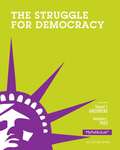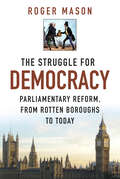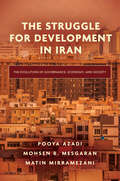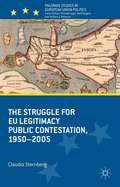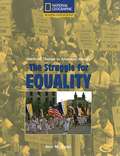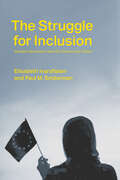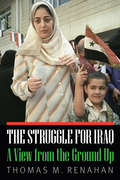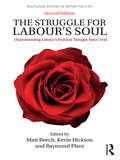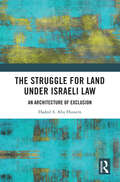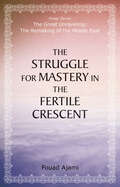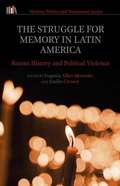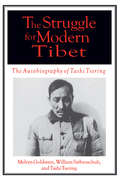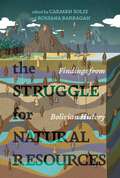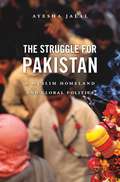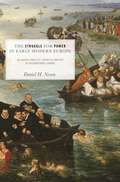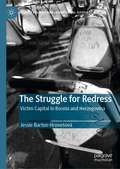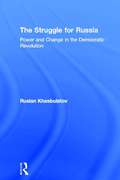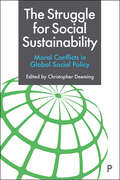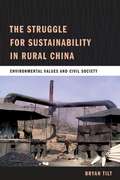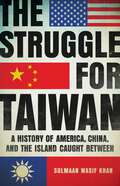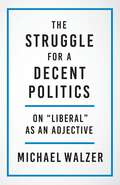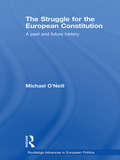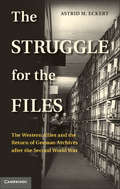- Table View
- List View
The Struggle for Democracy
by Edward Greenberg Benjamin PageTextbook on the US government, politics, and democracy.
The Struggle for Democracy (Eleventh Edition, 2012 Election Edition)
by Edward S. Benjamin I.The Struggle for Democracy provides students with an understanding of the American political process and with the tools to critically evaluate that process. This text focuses on the role that democracy has played in the American story and asks students how democracy is–or isn’t–revealed in our politics and government. It encourages students to examine how deeply connected politics and government are with historical, economic, and social influences.
The Struggle for Democracy: Parliamentary Reform, from Rotten Boroughs to Today
by Roger MasonPrior to the 1832 Reform Act the electoral system was rife with corruption and in desperate need of reform. In England and Wales only about 12 per cent of adult men had the vote and the proportion was even less in Scotland and Ireland. Women did not vote at all. A single person controlled a rotten borough that returned two Members of Parliament, and for a number of years one of them was the prime minister. Furthermore, not only did voting take place in public, so landlords could and did evict tenants who voted against their wishes, but voting qualifications also differed from place to place. With the use of many fascinating anecdotes, Roger Mason tells how we got from then to now. All the major reforms are covered: Catholic Emancipation, further Reform Acts, the end of the House of Lords veto and, of course, votes for women. This fascinating history offers a complete insight into the way we have voted from the beginnings of Parliament through to the present day.
The Struggle for Development in Iran: The Evolution of Governance, Economy, and Society
by Pooya Azadi Mohsen B. Mesgaran Matin MirramezaniThis book provides a multidimensional analysis of Iran's struggle for development between 1970 and 2020, focusing on fundamentals, institutions, and socioeconomic trends. The past several decades in Iran have been a period of sluggish and noninclusive economic growth, ill-fated social engineering with an Islamic template, political repression, and extensive environmental degradation. The intellectual discourse surrounding the impediments of growth in Iran has been dominated by an exaggerated notion of the role of ideology, class struggles, imperialism, and historical contingencies, overlooking the profound impacts of institutions and fundamental socioeconomic trends. This book aims to fill this gap using positive economics and data-driven analysis to cover a wide array of topics, such as governance, corruption, macroeconomy, population dynamics, labor, financial systems, energy, water scarcity, and food security. Illustrating clearly the complex interactions among different dimensions of Iran's development, this book will be essential for researchers, policy makers, and journalists.
The Struggle for EU Legitimacy
by Claudia Schrag SternbergThis award-winning book answers some of the big questions on the legitimacy of the European Union. Specifically, it looks at what it would mean for the EU to be considered a legitimate body and where our ideas on this question come from. The Struggle for EU Legitimacy traces the history of constructions and contestations of the EU's legitimacy, in discourses of the European institutions and in public debate. Through an interpretive, non-quantitative textual analysis of an eclectic range of sources, it examines both long-term patterns in EU-official discourses and their reception in member-state public spheres, specifically in the German and French debates on the Maastricht and Constitutional Draft Treaties. The story told portrays the history of legitimating the EU as a continuous contest over the ends and goals of integration, as well as a balancing act--which was inescapable given the nature of the integration project--between 'bringing the people in' and 'keeping them out'. In addition, it was a balancing act between actively politicizing and deliberately de-politicizing the stakes of EU politics.
The Struggle for Equality 1955-1975
by Ann M. RossiFrom 1955 to 1975, African Americans, Latinos, Native Americans, and women battled discrimination and fought for equal rights. Read about each group's victories and the challenges they face today.
The Struggle for Inclusion: Muslim Minorities and the Democratic Ethos
by Paul M. Sniderman Elisabeth IvarsflatenThe politics of inclusion is about more than hate, exclusion, and discrimination. It is a window into the moral character of contemporary liberal democracies. The Struggle for Inclusion introduces a new method to the study of public opinion: to probe, step by step, how far non-Muslim majorities are willing to be inclusive, where they draw the line, and why they draw it there and not elsewhere. Those committed to liberal democratic values and their concerns are the focus, not those advocating exclusion and intolerance. Notwithstanding the turbulence and violence of the last decade over issues of immigration and of Muslims in the West, the results of this study demonstrate that the largest number of citizens in contemporary liberal democracies are more open to inclusion of Muslims than has been recognized. Not less important, the book reveals limits on inclusion that follow from the friction between liberal democratic values. This pioneering work thus brings to light both pathways to progress and polarization traps.
The Struggle for Iraq: A View from the Ground Up
by Thomas M. RenahanThe Struggle for Iraq is a vivid personal account of the Iraqi people’s fight for democracy and justice by an American political scientist. Thomas M. Renahan arrived in southern Iraq just three days before the capture of Saddam Hussein in 2003. Later he worked in Baghdad through the dark days of the country’s sectarian violence and then in Iraqi Kurdistan. One of the few Americans to serve in all three major regions of Iraq, he spearheaded projects to develop democratic institutions, promote democracy and elections, and fight corruption. With inside accounts of two USAID projects and of a Kurdish government ministry, this engrossing and cautionary story highlights efforts to turn Baathist Iraq into a democratic country. Renahan examines the challenges faced by the Iraqi people and international development staff during this turbulent time, revealing both their successes and frustrations. Drawing on his on-the-ground civilian perspective, Renahan recounts how expatriate staff handled the hardships and dangers as well as the elaborate security required to protect them, how Iraqi staff coped with the personal security risks of working for Coalition organizations, and the street-level mayhem and violence, including the assassinations of close Iraqi friends. Although Iraq remains in crisis, it has largely defeated the ISIS terrorists who seized much of the country in 2014. Renahan emphasizes, however, that reconciliation is still the end game in Iraq. In the concluding chapters he explains how the United States can support this process and help resolve the complex problems between the Iraqi government and the independence-minded Kurds, offering hope for the future.
The Struggle for Labour's Soul: Understanding Labour's Political Thought Since 1945
by Matt Beech Raymond Plant Kevin HicksonThe election of the most left-wing Labour Party Leader since 1945, followed by the Party's third consecutive general election defeat and the ongoing cultural divisions around Brexit present an ideal opportunity for a thorough re-evaluation of the state of the Party within its broader ideological and historical context. This second edition of this highly respected book analyses the current developments and places them in their historical setting through a clear three-part framework of Ideological Positions, Struggles and Commentaries. Thoroughly updated and featuring contributions by leading academics and politicians, it continues to represent one of the most ground-breaking and thorough analyses of Labour's political thought in a generation and will be of key interest to scholars, students and observers of British Politics, British History, Party Politics, and the Labour Party.
The Struggle for Land Under Israeli Law: An Architecture of Exclusion
by Hadeel S. Abu HusseinThis book provides a comprehensive examination of land law for Arab Palestinians under Israeli law. Land is one of the core resources of human existence, development and activity. Therefore, it is also a key basis of political power and of social and economic status. Land regimes and planning regulations play a dynamic role in deciding how competing claims over resources will be resolved. According to legal geography, spatial ordering impacts legal regimes; whilst legal rules form social and human space. Through the lenses of international law, colonisation and legal geography, the book examines the land regime in Israel. More specifically, it endeavours to understand the spatial strategies adopted by Israel to organise the entire territorial expanse of the country as Jewish, while also excluding Arab Palestinian citizens of Israel and residents of East Jerusalem from the landscape. The book then details how the systematic nature and processes of marginalisation are mapped out across the civil, political and socio-economic landscape. This monograph will be of interest to international legal theorists, legal geographers, land lawyers and human rights practitioners and students; as well as to international scholars, NGOs and others focusing on the Israeli–Palestinian conflict.
The Struggle for Mastery in the Fertile Crescent (The Great Unraveling: The Remaking of th)
by Fouad AjamiIn this book, Fouad Ajami analyzes the struggle for influence along the Fertile Crescent—the stretch of land that runs from Iran's border with Iraq to the Mediterranean—among three of the regional powers who have stepped into the vacuum left by the West: Iran, Turkey, and Saudi Arabia. He explains that, of the three powers competing for influence, Saudi Arabia and Iran are in it for the long haul. Each of those powers has a sense of mission and constituencies that enable them to stick it out and pay the price for a sphere of influence. Each country's prospects for supremacy is detailed and Ajami asserts that Iran must ultimately be reckoned to be the strongest.
The Struggle for Memory in Latin America
by Eugenia Allier-Montaño Emilio CrenzelThis multi-disciplinary volume analyzes struggles over the memory of past political violence in Argentina, Brazil, Chile, Colombia, the United States, Guatemala, El Salvador, Mexico, Paraguay, Peru, and Uruguay. Each chapter offers a comprehensive history of the political violence that occurred in the second half of the twentieth century, analyzing its links with 1) the international context of the cold war, 2) the particular forms of repression and authoritarianism that prevailed in the domestic setting, 3) the social inequalities that were reinforced, and 4) the political, economic, and cultural transformations that Latin American societies were undergoing at the time. Considering the different paths that Latin American countries have taken in their efforts to confront history, the chapters examine how relevant actors look back on past events and vie with one another to give these events meaning in the public sphere. For each country examined, contributors consider the initiatives of transnational, regional, and national actors, as well as factors including class, gender, ethnicity, and geographic location. Chapters give political- and social-historical perspectives and employ tools from a variety of disciplines, including memory studies, history, political science, sociology, and anthropology.
The Struggle for Modern Tibet: The Autobiography of Tashi Tsering (Mellen Studies In Education Ser. #Vol. 88)
by Melvyn C. Goldstein William R Siebenschuh Tashi TseringThis captivating autobiography by a Tibetan educator and former political prisoner is full of twists and turns. Born in 1929 in a Tibetan village, Tsering developed a strong dislike of his country's theocratic ruling elite. As a 13-year-old member of the Dalai Lama's personal dance troupe, he was frequently whipped or beaten by teachers for minor infractions. A heterosexual, he escaped by becoming a drombo, or homosexual passive partner and sex-toy, for a well-connected monk. After studying at the University of Washington, he returned to Chinese-occupied Tibet in 1964, convinced that Tibet could become a modernized society based on socialist, egalitarian principles only through cooperation with the Chinese. Denounced as a 'counterrevolutionary' during Mao's Cultural Revolution, he was arrested in 1967 and spent six years in prison or doing forced labor in China. Officially exonerated in 1978, Tsering became a professor of English at Tibet University in Lhasa. He now raises funds to build schools in Tibet's villages, emphasizing Tibetan language and culture.
The Struggle for Natural Resources: Findings from Bolivian History (Diálogos Series)
by Carmen Soliz and Rossana BarragánThe Struggle for Natural Resources traces the troubled history of Bolivia's land and commodity disputes across five centuries, combining local, regional, national, and transnational scales. Enriched by the extractivism and commodity frontiers approaches to world history, the book treats Bolivia's political struggles over natural resources as long-term processes that outlast immediate political events. Exploration of the Bolivian case invites dialogue and comparison with other parts of the world, particularly regions and countries of the so-called Global South.The book begins by examining three Bolivian resources at the center of political dispute since the early colonial period, namely land, water, and minerals. Carmen Soliz, Rossana Barragán, and Sarah Hines show that, as in the colonial and early republican past, these resources have remained the focus of political contention to the present day. Until the end of the nineteenth century, Bolivia's battle over natural resources was primarily concentrated in the highlands and inter-Andean valleys. Beginning in the 1860s, the bicycle and soon the automobile industries triggered demand for natural rubber found in the heart of the Amazon. José Orsag analyzes the impact of this extractive economy at the turn of the twentieth century. The book concludes by examining two resources that are central to understanding the last century of Bolivia's history. Kevin Young examines the fraught business of hydrocarbons, and Thomas Grisaffi analyzes the coca/cocaine circuit. Each chapter studies the social dynamics and political conflicts that shaped the processes of extraction, exchange, and ownership of each of these resources
The Struggle for Pakistan
by Ayesha JalalEstablished as a homeland for India’s Muslims in 1947, Pakistan has had a tumultuous history that has unfolded in the vortex of dire regional and international conflicts. Beset by assassinations, coups, ethnic strife, and the breakaway of Bangladesh in 1971, the country has found itself too often contending with religious extremism and military authoritarianism. Now, in a probing biography of her native land amid the throes of global change, Ayesha Jalal provides an insider’s assessment of how this nuclear-armed Muslim nation evolved as it did and explains why its dilemmas weigh so heavily on prospects for peace in the region. <p><p> Attentive to Pakistan’s external relations as well as its internal dynamics, Jalal shows how the vexed relationship with the United States, border disputes with Afghanistan in the west, and the conflict with India over Kashmir in the east have played into the hands of the generals who purchased security at the cost of strong democratic institutions. Combined with domestic ethnic and regional rivalries, such pressures have created a siege mentality that encourages military domination and militant extremism. <p> Since 9/11, the country has been widely portrayed as a breeding ground for Islamic terrorism. Assessing the threats posed by Al-Qaeda and the Taliban as American troops withdraw from Afghanistan, Jalal contends that the battle for Pakistan’s soul is far from over. Her definitive biography reveals how pluralism and democracy continue to struggle for a place in this Muslim homeland, where they are so essential to its future.
The Struggle for Power in Early Modern Europe: Religious Conflict, Dynastic Empires, and International Change (Princeton Studies in International History and Politics #116)
by Daniel H. NexonScholars have long argued over whether the 1648 Peace of Westphalia, which ended more than a century of religious conflict arising from the Protestant Reformations, inaugurated the modern sovereign-state system. But they largely ignore a more fundamental question: why did the emergence of new forms of religious heterodoxy during the Reformations spark such violent upheaval and nearly topple the old political order? In this book, Daniel Nexon demonstrates that the answer lies in understanding how the mobilization of transnational religious movements intersects with--and can destabilize--imperial forms of rule. Taking a fresh look at the pivotal events of the sixteenth and seventeenth centuries--including the Schmalkaldic War, the Dutch Revolt, and the Thirty Years' War--Nexon argues that early modern "composite" political communities had more in common with empires than with modern states, and introduces a theory of imperial dynamics that explains how religious movements altered Europe's balance of power. He shows how the Reformations gave rise to crosscutting religious networks that undermined the ability of early modern European rulers to divide and contain local resistance to their authority. In doing so, the Reformations produced a series of crises in the European order and crippled the Habsburg bid for hegemony. Nexon's account of these processes provides a theoretical and analytic framework that not only challenges the way international relations scholars think about state formation and international change, but enables us to better understand global politics today.
The Struggle for Redress: Victim Capital in Bosnia and Herzegovina (Memory Politics and Transitional Justice)
by Jessie Barton-HronešováThis book explores pathways to redress for main groups of victims/survivors of the 1992-5 Bosnian war —families of missing persons, victims of torture, survivors of sexual violence, and victims suffering physical disabilities and harm. The author traces the history of redress-making for each of these groups and shows how differently they have been treated by Bosnian authorities at the state and subnational level. In Bosnia and Herzegovina, thousands of war victims have had to suffer re-traumatising ordeals in order to secure partial redress for their suffering during 1992–1995 and after. While some, such as victims of sexual violence, have been legally recognised and offered financial and service-based compensation, others, such as victims of torture, have been recognized only recently with a clear geographical limitation. The main aim of the book is to explore the politics behind recognizing victimhood and awarding redress in a country that has been divided by instrumentalized identity cleavages, widespread patronage and debilitating war legacies. It shows how war victims/survivors navigate such fragmented and challenging public landscape in order to secure their rights.
The Struggle for Russia: Power and Change in the Democratic Revolution
by Ruslan KhasbulatovRuslan Khasbulatov has played a central role in the dramatic changes in Russia over the last three years. He became Acting Speaker of the Russian parliament in July 1991 and helped to defend the Russian White House during the coup attempt of that August. He has since consolidated his influence in the Parliament, and has become one of the country's most powerful and controversial politicians. In this book, Khasbulatov presents his views on Russian politics before the coup, offers a vivid first-hand account of the resistance to the coup, and concludes with his views on the problem of power in the new Russia. He provides a unique insight into the development of Russia from communism to embryonic democracy and an unparalleled insider's account of some of the most momentous events of the late twentieth century.
The Struggle for Social Sustainability: Moral Conflicts in Global Social Policy
by Christopher DeemingThe ongoing social crises and moral conflicts evident in global social policy debates are addressed in this timely volume. Leading interdisciplinary scholars focus on the ‘social’ of social policy, which is increasingly conceived in a globalised form, as new international agreements and global goals engender social struggles. They tackle pressing ‘social questions’, many of which have been exacerbated by COVID-19, including growing inequality, changing world population, ageing societies, migration and intersectional disadvantage. This ground-breaking volume critically engages with contested conceptions of the social which are increasingly deployed by international institutions and policy makers. Focusing on social sustainability, social cohesion, social justice, social wellbeing and social progress this text is even more crucial as policy makers look to accelerate socially sustainable solutions to the world’s biggest challenges.
The Struggle for Sustainability in Rural China: Environmental Values and Civil Society
by Bryan TiltThough China's economy is projected to become the world's largest within the next twenty years, industrial pollution threatens both the health of the country's citizens and the natural resources on which their economy depends. Capturing the consequences of this reality, Bryan Tilt conducts an in-depth, ethnographic study of Futian Township, a rural community reeling from pollution. The industrial township is located in the populous southwestern province of Sichuan. Three local factories-a zinc smelter, a coking plant, and a coal-washing plant-produce air and water pollution that far exceeds the standards set by the World Health Organization and China's Ministry of Environmental Protection. Interviewing state and company officials, factory workers, farmers, and scientists, Tilt shows how residents cope with this pollution and how they view its effects on health and economic growth. Striking at the heart of the community's environmental values, he explores the intersection between civil society and environmental policy, weighing the tradeoffs between protection and economic growth. Tilt ultimately finds that the residents are quite concerned about pollution, and he investigates the various strategies they use to fight it. His study unravels the complexity of sustainable development within a rapidly changing nation.
The Struggle for Taiwan: A History of America, China, and the Island Caught Between
by Sulmaan Wasif KhanA concise, definitive history of the precarious relationship among the US, China, and Taiwan As tensions over Taiwan escalate, the United States and China stand on the brink of a catastrophic war. Resolving the impasse demands we understand how it began. In 1943, the Allies declared that Japanese-held Taiwan would return to China at the conclusion of World War II. The Chinese civil war led to a change of plans. The Communist Party came to power in China and the defeated Nationalist leader, Chiang Kai-shek, fled to Taiwan, where he was afforded US protection. The specter of conflict has loomed ever since. In The Struggle for Taiwan, Sulmaan Wasif Khan offers the first comprehensive history of the triangular relationship between the United States, China, and Taiwan, exploring America&’s ambivalent commitment to Taiwan&’s defense, China&’s bitterness about the separation, and Taiwan&’s impressive transformation into a flourishing democracy. War is not inevitable, Khan shows, but to avoid it, decision-makers must heed the lessons of the past. From the White Terror to the Taiwan Straits Crises, from the normalization of Sino-American relations to Trump-era rising tensions, The Struggle for Taiwan charts the paths to our present predicament to show what futures might be possible.
The Struggle for a Decent Politics: On "Liberal" as an Adjective
by Michael WalzerA testament to what it means to be liberal by one of the most prominent political philosophers of our era There was a time when liberalism was an ism like any other, but that time, writes Michael Walzer, is gone. “Liberal” now conveys not a specific ideology but a moral stance, so the word is best conceived not as a noun but as an adjective—one is a “liberal democrat” or a “liberal nationalist.” Walzer itemizes the characteristics described by “liberal” in an inventory of his own deepest political and moral commitments—among other things, to the principle of equality, to the rule of law, and to a pluralism that is both political and cultural. Unabashedly asserting that liberalism comprises a universal set of values (“they must be universal,” he writes, “since they are under assault around the world”), Walzer reminds us in this inspiring book why those values are worth fighting for.
The Struggle for the Eurasian Borderlands
by Alfred J. RieberThis is the first in a trilogy of books to explore the Eurasian borderlands as contested 'shatter zones' which have generated some of the world's most significant conflicts. Analysing the struggles of the Habsburg, Russian, Ottoman, Iranian and Qing Empires, Alfred Rieber surveys the period from the rise of the great multicultural, conquest empires in the late medieval/early modern period to their collapse in the early twentieth century. He charts how these empires expanded along moving, military frontiers, competing with one another in war, diplomacy and cultural practices whilst the subjugated peoples of the borderlands strove to maintain their cultures and defend their autonomy. The gradual and fragmentary adaptation of western constitutional ideas, military reforms, cultural practices and economic penetration began to undermine these ruling ideologies and institutions leading to the collapse of all five empires in revolution and war within little more than a decade between 1911 and 1923.
The Struggle for the European Constitution: A Past and Future History (Routledge Advances in European Politics)
by Michael O'NeillThe European Union (EU) Constitution was one of the most important developments in the history of the EU, aiming to make the EU more transparent, relevant and accountable to the citizens of its member states. Current anxieties over the pace and direction of EU integration place this comprehensive study at the forefront of the EU governance debate. O’Neill goes far beyond a simple account of the EU Constitution, focussing also on the response to the current crisis of confidence between the Union and its citizens and how those in power have responded to the challenge. Making a substantial contribution to literature on the EU, key discussion points include: The political crisis behind the Constitution The power politics at work in the negotiations How the Constitution affects EU policymaking The impact on the citizens of the EU This is essential reading for all those wishing to understand the background to one of the key areas within European Politics. Michael O’Neill is Jean Monnet Professor in EU Politics at Nottingham Trent University.
The Struggle for the Files
by Astrid M. EckertWhen American and British troops swept through the German Reich in the spring of 1945, they confiscated a broad range of government papers and archives. These records were subsequently used in war crimes trials and published under Allied auspices to document the German road to war. In 1949, the West Germans asked for their return, considering the request one of the benchmarks of their new state sovereignty. This book traces the tangled history of the captured German records and the extended negotiations for their return into German custody. Based on meticulous research in British, American and German archives, The Struggle for the Files highlights an overlooked aspect of early West German diplomacy and international relations. All participants were aware that the files constituted historical material essential to write German history and at stake was nothing less than the power to interpret the recent German past.

